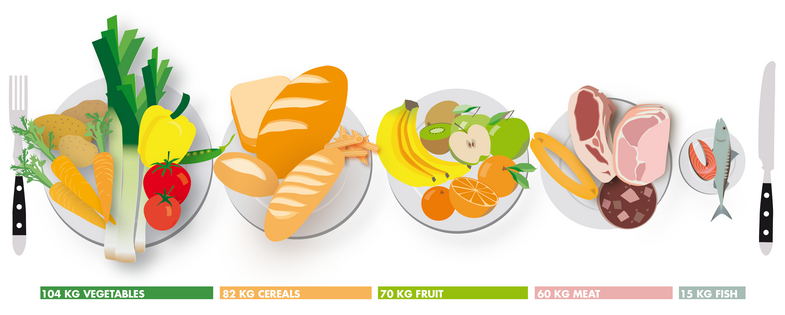First, the good news from the Nutrition Report: vegetables are the most consumed food in Germany, at 104 kilograms per capita per year – and rising. Tomatoes, carrots, beetroot and onions are particularly popular. Germans are also very fond of pulses. “Cabbages, broccoli, blueberries and blackberries are particularly good for consumers because, in addition to being rich in vitamins, trace elements and fibre, they can leave you feeling full with comparatively few calories,” said diabetologist Blüher.
Another positive finding: Germans drink a lot of mineral water as well as herbal and fruit teas. Their annual consumption of H2O has risen by 1.5 litres, reaching 154 litres per capita. The professor of clinical obesity research said: “When advising people about nutrition, we stress the importance of not taking in calories through drinks. In this regard, water and unsweetened beverages such as tea play a key role in preventing and treating obesity.” The analysis of dietary habits shows that overall alcohol consumption is falling in Germany, with beer seeing the most significant decline of 900 millilitres per person per year.
There have also been some declines in fruit consumption. Apples, pears and grapes are less popular than in the past, while berries and bananas are faring better. Cereal products and fresh potatoes are less likely to be on a German plate than they were a few years ago. Cheese consumption, on the other hand, continues to rise, with an average increase of 0.2 kilograms per person per year.
Germans are also eating more beef, veal and poultry. Only annual pork consumption has fallen – by 0.37 kilograms per person. Total meat consumption has remained largely unchanged for a long time, at around 60 kilograms per capita per year. “In some cases, eating a lot of meat results in significant health problems and can contribute to obesity. This chronic disease cannot be cured, but it can be treated,” said Blüher.
For the obesity researcher, the message for Germans is clear: “If it were possible to reduce the consumption of animal-based foods in favour of a plant-based diet rich in vegetables, pulses, fruit, cereal products, potatoes and nuts, we could reduce the risks to our health and the climate at the same time. In this way, individuals can not only do something for their own health, but also make a difference to society as a whole.
Leipzig University boasts a diverse research landscape dedicated to the prevention and treatment of obesity. Obesity research in Leipzig encompasses a wide range of topics, including genetic associations, metabolic disorders, mechanisms of fat accumulation, the role of the brain in eating, and therapeutic interventions for losing and maintaining weight.































































